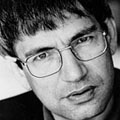Season 5
from april 29th to may 1st, 2011
at 2pm and at 4pm
at the International Antiquarian Book Fair
at the Grand Auditorium of the Grand Palais, Paris
 © Opale
© Opale
ORHAN PAMUK
PRIX NOBEL 2006
Orhan Pamuk was born on the 7th of June 1952 in Istanbul, to a well off, secular family. His father was a civil engineer like his uncle and his paternal grandfather. It was Pamuk‘s grandfather, an industrial magnate, who made the family’s riches. Pamuk grew up in the bourgeois, westernised district of Nisantasi, and studied at a secular American school, Robert College. During his youth he was intent on becoming a painter. Having studied architecture at the Polytechnic School, he then went on to do a course in journalism at the University of Istanbul. He would practise neither profession upon leaving. At the age of 23 he decided to consecrate himself entirely to writing, and retreated into his apartment, from where his window looked out across the Bosphorus, to Asia.
His first book was published seven years later in 1982, Cevdet and his sons, which is a family chronicle based on three generations of a wealthy family, not unlike his own, in the manner of Thomas Mann
Pamuk spent 1985 to 1988 in the United States, where he was a writer in residence at Columbia University and at the University of Iowa. It was here that he put together the majority of his second novel The House of Silence.
He then returned to Istanbul. It was with his third novel The White Castle that he obtained international success, and became the best selling author in Turkish history. The novel examines the relationship between an Ottoman astrologer and a Venetian slave, and in doing so the relationship between Europe and Asia. For Pamuk Turkey acts above all as the prism reflecting the values of East and West. With erudition and scepticism he manages to dismantle the conventions of Orientalism.
In 1994 he published The Black Book, a novel that is unusual for being both experimental and yet appealing to a mass market. His following novel The New Life, the story of a group of university students influenced by a mysterious book is one of the most widely read novels in Turkey. In 2001 My Name is Red came out, and in 2005 Snow, which Pamuk described as his first and last political novel. Set in the small town of Kars in the north of Turkey, it is the story of the tensions and troubles between soldiers, political islamists, secularists and Turkish and Kurd nationalists.
Orhan Pamuk is a controversial figure in his homeland, despite the fact that he considers himself above all a literary author without political intentions. Nonetheless he was the first writer in the Muslim world to condemn the fatwa against Salman Rushdie, and he defended fellow writer Yasar Kemal when he was called up to justice in 1995. The most notable area of controversy however stems from Pamuk’s comments about the Armenian Genocide. In an interview with a Swiss newspaper, Pamuk stated “ 30,000 Kurds and a million Armenians were killed in Turkey and no one dares talk about it except me.” He subsequently had charges brought against him for insulting the Turkish nation and Turkishness, an offence which according to the Turkish Penal Code merits between six months and three years in jail. Amnesty International, the Pen Club of America, and a number of world famous writers, including Jose Saramago, Gunter Grass, Umberto Eco, and Gabriel Garcia Marquez, signed a petition in protest against the action taken against Pamuk.
The charges were dropped in 2006 on a technicality, with many suggesting that Turkey’s entry into the EU would be jeopardised by such a high profile case, given that the nation’s human rights record had already been a source of concern for the member states.
Orhan Pamuk has received the following prizes and distinctions : Milliyet Roman Yar??mas? Ödülü (1979, shared with Mehmet Ero?lu), Orhan Kemal Roman Ödülü (1983), Madaral? roman Ödülü (1984), the Independent Award for Foreign Fiction (1990), Prix de la Découverte Européenne (1991), Prix France Culture (1995), Prix du Meilleur Livre Étranger (2002), Premio Grinzane Cavour (2002), the IMPAC Dublin Award (2003), Ricarda-Huch-Preis (2005), Der Friedenspreis des Deutschen Buchhandels (2005), Prix Médicis étranger (2005), Prix Méditerranée Étranger (2006).

